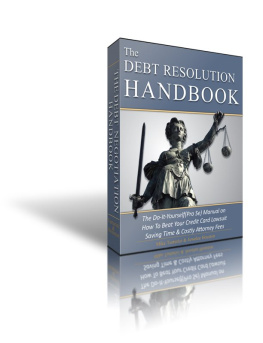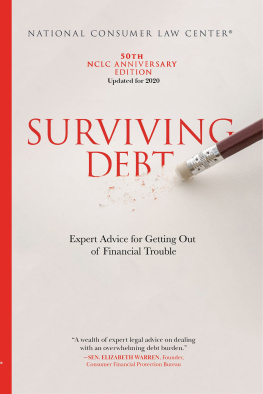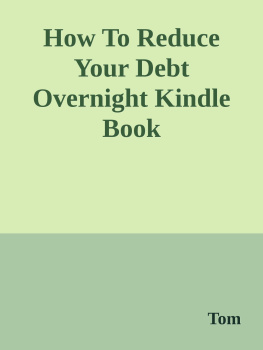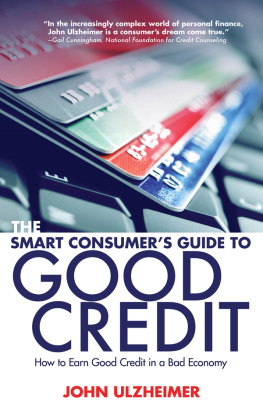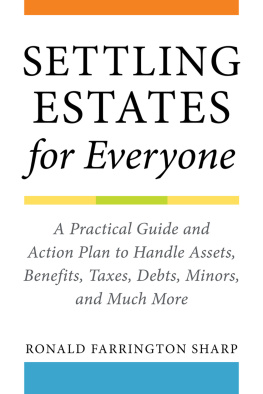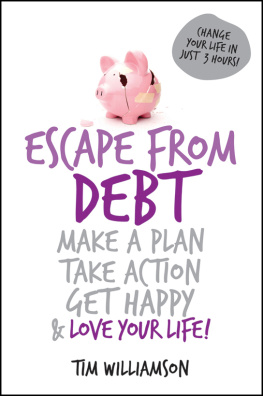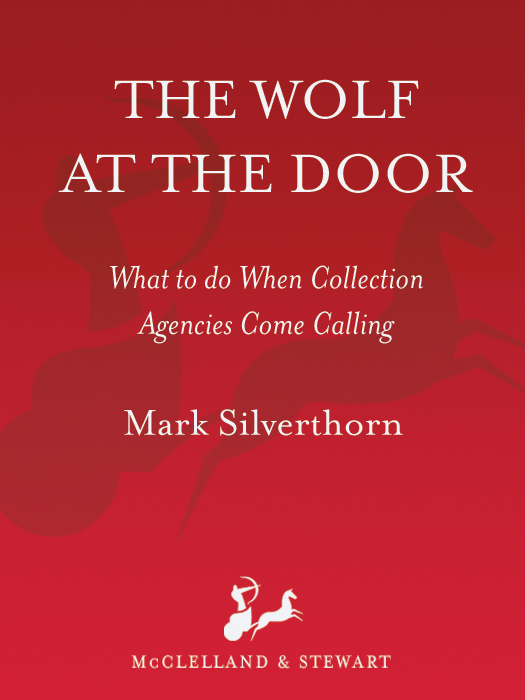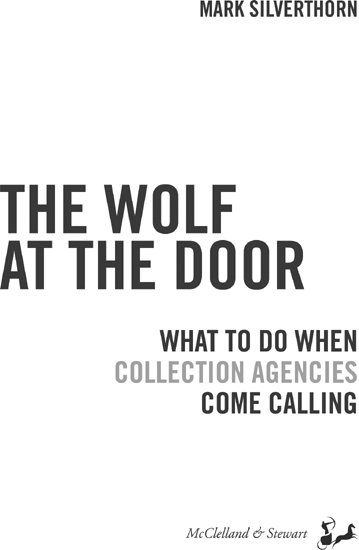CONTENTS
PART ONE :
Chapter 1:
Chapter 2:
PART TWO :
Chapter 3:
Chapter 4:
Chapter 5:
PART THREE :
Chapter 6:
Chapter 7:
Chapter 8:
Chapter 9:
Chapter 10:
Chapter 11:
PART FOUR :
Chapter 12:
Chapter 13:
Chapter 14:
Chapter 15:
Chapter 16:
Chapter 17:
Chapter 18:
Chapter 19:
Chapter 20:
Chapter 21:
PART FIVE :
Chapter 22:
Chapter 23:
Chapter 24:
Chapter 25:
Chapter 26:
Appendices
INTRODUCTION
If youre reading this book youre probably experiencing serious debt problems. Maybe youve been having trouble making the minimum monthly payments on your credit cards. Maybe your utility bills are mounting and you just cant pay them any more. You might already be receiving bothersome collection calls about your overdue bills, and if not, you might soon because youre getting buried under them. People run into debt problems for all sorts of reasons: you might have recently lost your job or are earning less than you used to, or maybe you or your family has health issues, or your expenses have gone up because of a divorce, a separation, or the end of a common-law relationship. Whatever the cause, this is probably a tough time in your life, and you may be feeling anxious and afraid about what the future may bring.
Let me assure you: you are not alone.
Today more than a million Canadians are facing serious debt problems, and things have become much worse since the fall of 2008, when the worlds economy fell off a cliff. For example, the number of personal bankruptcies in May 2009 was 31 per cent higher than in the previous May. Almost every day I receive telephone calls from Canadians who used to enjoy a comfortable lifestyle but who now worry about going bankrupt because their household income is less than it was two years ago, their credit card interest rates have gone up, or they have little or no equity in their home.
This is a situation Im all too familiar with. Im trained as a lawyer, and from 1994 to 2006 I worked almost exclusively on behalf of collection agencies, helping them recover tens of millions of dollars from consumers like you. My law office was located right on the collection floor at some of the largest agencies in the country. In many cases, anywhere between 50 and 200 collectors would be sitting at workstations just a few steps from my office door. I dealt with various agency employees owners, senior management, collection supervisors, and collectors, as well as customer service, human resources, accounting, and IT on virtually a daily basis. I would take coffee breaks and have lunch with these people. I like to think that some of them were, and even today are, my friends.
During that period, I sent out my share of collection letters to consumers across Canada, and my law firm also employed as many as 30 legal assistants who spent most of their days making collection calls. At some point in the past maybe you received a letter or phone call from my law firm demanding payment of an outstanding account. Apart from doing collections, my experience also includes managing a collection agencys legal department, reviewing contracts with creditors, defending collection agencies in lawsuits, and responding to complaints brought against them.
Over time I became increasingly uncomfortable with how I earned a living, and in 2007 I decided to stop representing collection agencies and stop doing debt collection work. After a few months of soul-searching, I came to the conclusion that I might be able to earn a living providing advice and assistance to consumers who had debt problems instead. Over the next several months I began reorienting my two law practices (in Ontario and New York state) toward helping consumers. I now have clients in virtually every province. I have found my niche in the world, I enjoy my work, and I sleep very well at night.
After I switched sides, I also started writing this book. My goal in doing so is to give you practical advice that you wont find in one place anywhere else. The Wolf at the Door will show you how to stop, avoid, or discourage collection calls. It also describes the debt collection process and your eight options for dealing with debt, which should help you make better decisions in this area. Things are probably not as bleak as you think! Even if you owe enormous sums to various creditors, you might be able to extricate yourself from your current financial hole. Finally, this book should bring you some peace of mind, and depending upon your particular financial situation, might save you money in some cases even thousands of dollars.
The book is written based on my personal experience acting as a collection lawyer and with input from a number of senior people currently working in the collection industry. I have also conducted extensive interviews with bankruptcy trustees and front-line counsellors at credit counselling agencies and firms providing debt settlement and debt consulting services. Unfortunately, too few of these individuals fully appreciate the entire range of solutions available to you in dealing with your debts, and they dont always offer unbiased information about all of your options. I will explain all of them, helping you make informed decisions and do whats best for you and your family.
Part One of this book, So Youre Having Financial Problems, gives background information about how creditors attempt to collect your debt it helps you know your opponent. You will be introduced to those individuals demanding money from you: collectors employed by your creditor or a collection agency, and law firms. Part Two, How to Stop, Avoid, or Discourage Collection Calls, explains how to deal with collection calls. Part Three, How to Avoid Paying Your Outstanding Accounts, explains the various reasons that you might not have to pay your bills. Part Four, How to Resolve Your Outstanding Debts and Protect Your Credit Rating, outlines your options for handling your accounts, and Part Five, How to Deal with Unprofessional Bill Collectors, covers what to do if a collector is behaving inappropriately in his dealings with you.
Collection agencies, especially the larger ones, are able to draw on tremendous resources in their attempts to collect money from you. Some collection agencies have state-of-the-art call centres, often employing hundreds of collectors and using sophisticated computer and telephone equipment operations worth millions of dollars. The collector phoning you will have gone through some kind of training program, may have been employed for several years as a collector, and has access to the shared wisdom of the management team at her place of employment. In contrast, you likely have little experience, knowledge, and resources to deal with their calls.
Debt collection is a serious matter, and owing money to your creditors can have serious consequences, but to help you understand what is taking place, I find it useful to describe the process as a game. Personally, I like to watch a sporting event between two evenly matched opponents. When you read this book, you might think of me as the coach for your team, one who used to play for the opposition. Your creditors team is wearing the black jerseys. Your team is wearing the white jerseys and includes your household members, family, and possibly some kind of agent, a debt settlement firm, a lawyer, or even a credit counselling agency. If you read this book carefully, understand it, and apply what you have learned, my hope is that you will find the playing field between you and your collectors levelled and that you will be able to win the contest with your creditors.


